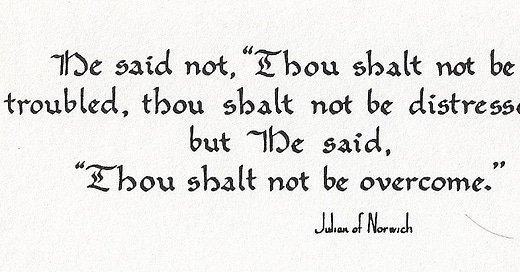Why Politically Engaged Christians Are Good for Our Politics
“What the soul is in the body, that are Christians to the world”
My surprise this morning was coming across research that said –
“Episcopalians get out there and engage the political process. ... political involvement for them does not revolve primarily around the candidates or if it’s an open seat election or there’s an incumbent... I feel confident in saying that no Protestant denomination is going to be more politically vocal than members of the Episcopal Church. ... The average Episcopalian is more politically engaged than the average atheist” In the comments the author added this – “31% of Episcopalians voted for Trump in 2020.”
This is from Ryan Burge is an associate professor at Eastern Illinois University, 60 Minutes said he is the "leading data analysts on religion and politics" within the United States.
Burge puts that in a broader context so read the article - What Religious Groups are The Most Politically Active?
Maybe I shouldn’t have been so surprised. Of the 45 American Presidents 11 were Episcopalians. The first being George Washington and the most recent being George H. W. Bush. In the 118th Congress the statistics combine Anglican and Episcopalian (so much for the distinctions that are so meaningful to some!) and say that of 469 members there are 22 or 4.1% of the House from groups that make up 1% of the US population. Interestingly enough Roman Catholics and Jews also have a higher representation rate in comparison to their portion of the population.
The Renewal – Apostolate Cycle
Burge also wrote, “tens of millions of Americans feel like it’s their religious duty to be politically involved in one way or another.” Many of us assume that an involvement in the civic life of the nation is an apostolic activity.
The Renewal – Apostolate Cycle describes the movement “between a conscious and intentional attention to God, prayer life, our relationships, Christian formation and a subconscious reliance upon God as members of the Body of Christ, in the workplace, family, friendship, civic life and congregational life.” (Fill All Things). More on the Renewal – Apostolate Cycle: Chapter 4 An Energy Not Our Own and Fill All Things, Chapter 1.
Subordinated to something transcendent
Today’s “Dispatch Faith” explores the issue of the intersection between religious faith and political activity - Why Politically Engaged Christians Are Good for Our Politics.
They approach the issue with an emphasis on the evangelical involvement while raising issues that cut across denominational communities. This includes reminding us of the early church’s understanding as seen in Romans 13 and other writings.
“In fact, in their defense of themselves before a tyrannical Roman government, church leaders often made the case that the church’s very presence was good for society. One second century apologetic, Letter to Diognetus, outlines the Christian posture toward the world: “To sum up all in one word—what the soul is in the body, that are Christians to the world. The soul is dispersed in all the members of the body, and Christians are scattered through all the cities of the world. The soul dwells in the body, yet is not of the body; and Christians dwell in the world, yet are not of the world. The invisible soul is guarded by the visible body, and Christians are known indeed to be in the world, but their godliness remains invisible.” Christians were to be the “soul” of society, even while possessing little power.”
The article ends with a fairly standard approach to the Christian involvement in political life.
“This is why we need more, not fewer, people for whom politics is important, but not ultimate, where allegiances to party and candidate are subordinated to something transcendent. Partaking in the weekly rituals of prayer, Bible study, and face-to-face community fellowship brings focus and realism to our public life. Hearing, weekly, that the most powerful leaders in this world have an expiration date, that there is a higher kingdom that demands our ultimate allegiance keeps us from seeing every turn in the news cycle as existential. We engage, but with the hope of a people who believe that Christ “has overcome the world.” Imagine more folks with this heavenly perspective, who have intentionally cultivated virtue, actively voting in our presidential primaries, as a balance to the tiny percentage who actually show up to nominate major party candidates. Imagine more folks who, with a distinctive way of being, are guided by the wisdom of 1 Peter 2:17, where the apostle helps Christians rightly order our heavenly priorities and our earthly commitments: “Honor everyone, love the brotherhood, fear God, honor the King.” People of faith do not and will not always get this ordering right. Even the best are deeply flawed, unfinished works in progress. But the alternative—a politics devoid of sober Christian witness—is not good news for the country we love.”
To see the whole article you’ll need to sign up for a free subscription. - Why Politically Engaged Christians Are Good for Our Politics.
This abides,
Brother Robert, OA




